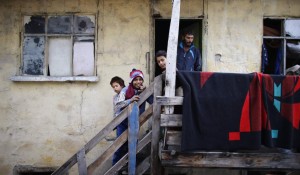Syrian crisis deepens with four million displaced

A Syrian refugee family
Photo: UMIT BEKTAS/REUTERS
As the United Nations and global NGOs continue to grapple with the enormity of what the UN’s High Commissioner for Refugees has called the organisation’s greatest challenge, 95 per cent of these refugees are being sheltered by just five countries: Turkey, Lebanon, Jordan, Iraq and Egypt.
Just two per cent of these people have been offered sanctuary by the rest of the world and although UNHCR has identified 380,000 vulnerable Syrians as in need of resettlement, just 79,000 have been offered a chance to restart their lives abroad through resettlement programs.
And by the end of 2014, just a fraction of refugees offered resettlement had actually completed the journey to a new country.
Lebanon is hosting more than 1.2 million refugees in an area half the size of Wales and three times smaller than Belgium. Its population has increased by 26 per cent – or the equivalent of Australia taking in 5 million extra people.
Some of the world’s wealthiest countries including all six Gulf states, Russia and Japan have failed to pledge to resettle a single refugee.
Meanwhile, a new report from Amnesty International reveals the human face of Syria’s refugee crisis, through the stories of people and families who have fled the conflict and are struggling to survive in Lebanon, Jordan and Iraq.
The report highlights the life-changing opportunity that international resettlement can offer to some of the most vulnerable refugees and comes as Amnesty International has launched a campaign to encourage countries to take in refugees from Syria.
The campaign aims to put pressure on wealthy countries, through public support, to accept a greater numbers of vulnerable refugees from Syria through resettlement and other humanitarian admission programs. So far, the international response to the crisis has been pitiful and some of the richest countries have done very little.
“With close to 4 million refugees, the scale of the crisis is overwhelming. This report tells the stories of the real people behind the numbers, in their own words,” said Sherif Elsayed-Ali, Amnesty International’s Head of Refugee and Migrants’ Rights.
“Many of them have been through hell, they have endured heart-breaking ordeals and face daily struggles in their current lives as refugees. Resettlement can help offer them a much needed lifeline – a glimmer of hope for a better future,” Mr Elsayed-Ali said.
Around 380,000 refugees have been identified as vulnerable and in need of resettlement by the UN Refugee Agency (UNHCR). They include torture and rape survivors, sick or unaccompanied children and others who are considered vulnerable. Only a tiny fraction of refugees have been resettled so far.
“World leaders cannot go on turning their backs on vulnerable refugees. It’s easy to feel helpless when facing a crisis of this magnitude but encouraging world leaders to resettle refugees can have a life-changing impact,” Mr Elsayed-Ali said.
As well as enabling refugees to rebuild their lives in peace and stability with access to the care and support that they need, resettlement contributes to sharing the responsibility of this historic refugee crisis.
Laurie Nowell
AMES Senior Journalist












